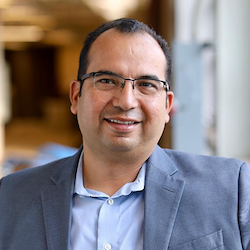Graduate Student Seminar
January 31, 2025
10:00 a.m. ET
McConomy Auditorium, First Floor Cohon University Center
January 31, 2025
10:00 a.m. ET
McConomy Auditorium, First Floor Cohon University Center
Recent advancements in materials discovery have shifted from traditional, labor-intensive methods to data-driven, informatics-based approaches. High-throughput (HTP) experimentation and computation dominate current efforts but are constrained by practical limitations such as resource availability and human decision-making bottlenecks. To address these, framing materials discovery as an optimal experimental design problem has emerged as a promising paradigm. In this talk, I will explore the application of Bayesian Optimization (BO) in the targeted exploration of the CoCrFeNiVAl FCC high-entropy alloy space. This integrated framework identifies Pareto-optimal solutions across performance metrics, including strength, hardness, and strain rate sensitivity, while leveraging advanced cyber-physical workflows. By utilizing only 0.15% of this vast design space, our iterative synthesis-characterization-testing loops achieved unprecedented acceleration in discovering optimal alloy compositions. The results highlight the efficiency of Bayesian-guided discovery in navigating complex, multi-objective spaces and the insights gained into the underlying chemical and microstructural drivers of alloy performance. I will also discuss current challenges, the impact of these findings on alloy optimization processes, and future opportunities for integrating AI/ML-assisted simulations with experimental workflows. This approach represents a significant step toward autonomous materials design and scalable multi-objective materials optimization.

Arróyave received his Ph.D in Materials Science from the Massachusetts Institute of Technology in 2004. After completing a postdoctoral stay at Penn State, he joined the department of Mechanical Engineering at Texas A&M University in 2006, becoming a founding faculty of the Department of Materials Science and Engineering in 2013. His main areas of interest include: 1) computational thermodynamics and phase stability in structural and functional materials; 2) kinetic processes and microstructure evolution simulation; 3) multi-scale computational materials science; 4) simulation-assisted materials design; 5) machine learning and artificial intelligence-enabled materials discovery; 6) Integrated Computational Materials Engineering in Additive Manufacturing. He has worked on a number of materials classes including structural and functional alloys, thin films, and nano materials with applications in energy, transportation, etc. He has received several honors and distinctions including the NSF CAREER Award , the TMS 2019 Brimacombe Medal and the 2023 Acta Materialia Silver Medal. He has authored or co-authored close to 300 peer-reviewed articles and conference proceedings.
July 8 2025
1:00 PM ET
Materials Science and Engineering
"Uncovering the Driving Force of Thermal-Activated Grain Boundary Migration in Polycrystals," presented by Zipeng Xu
Doherty A310
July 29 2025
11:00 AM ET
Materials Science and Engineering
Graduate Programs Information Session
Learn more about the master's and doctoral programs in materials science and engineering at CMU.
August 13-15 2025
Materials Science and Engineering
Workshop on Methods for Three-Dimensional Microstructure Studies
The workshop is intended for researchers at all levels and will combine presentations on 3D microstructure science as well as practical presentations on the tools and methods for reconstructing, analyzing and synthesizing.
Scott Hall 5201 (Bosch Sparks Conference Room)